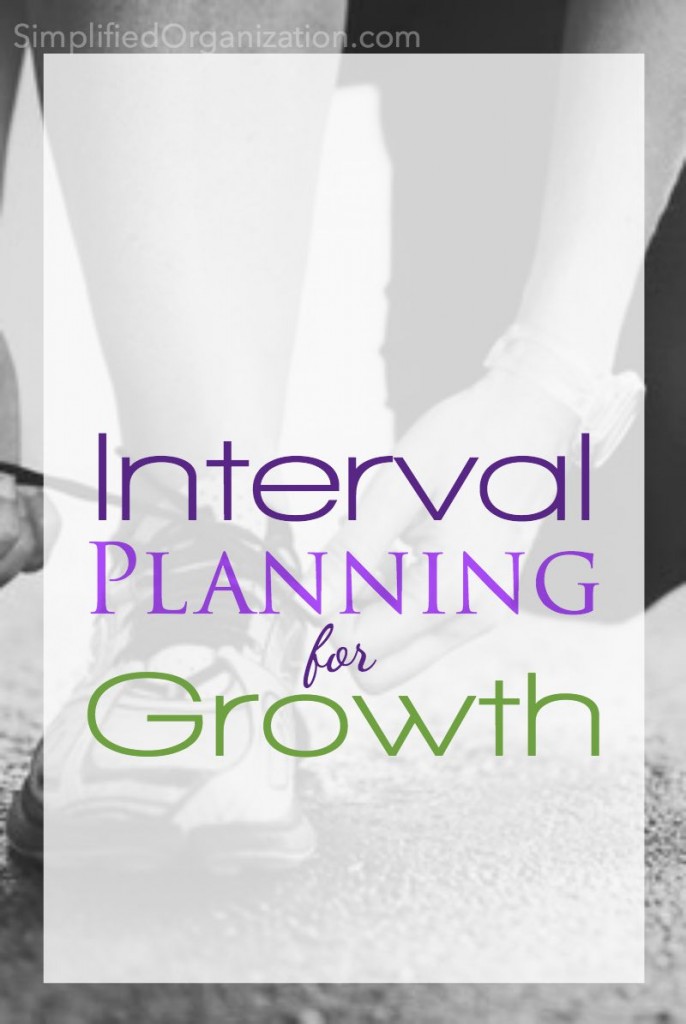Interval Planning for Growth
The problem with much of the productivity and planning advice out there is that it begins with a vision for a 5-year outcome. When we as mothers at home try to do that, we are rather at a loss. We might not even know how many children we’ll have in 5 years. If your oldest is 5, you’re not likely to accurately foresee what it’s like to have a 10 year old – and the same is true if your oldest is 10 and you’re trying to predict 15.
We have to put one foot in front of the other where we are, and not get too wrapped up in predictions and visions. We should have a general direction, but we don’t know how that will play out.

Rather than try to shoot for some 5-year outcome, we should have a general purpose and direction (this comes by knowing your vocations) and then make a short-term plan.
Make a plan that is only 6-12 weeks in breadth. We can work toward ends in a chunk that small. The ends might not be as exciting as a grand 5-year vision, but that’s because it’s actually realistic – looking at that shorter amount of time allows you to make smart and meaningful choices about what’s best to do next.
Listen to this post!
SO006 | Interval Planning: Grow your Capacity.
Interval
I call this interval planning because I was inspired to begin planning this way while I was working through the Couch to 5K program – an interval training program that moves you from running only 1 minute at a time to running 30 minutes straight in 9 weeks.
While I was trying to get into shape, I was also trying to get my home into shape. What can I say? It was the “My baby is nearly a year old and I really need to get my act together” phase. Been there? I’ve been there 5 times.
As I was huffing and puffing up the sidewalk one day, I connected the dots between a programmer-productivity model my husband’s company uses (Scrum or Agile Development), my 6-week school terms, and interval running.
When we do school for 6 weeks at a time and then take a week off, I get the extra push to finish out the plan when I feel like throwing in the towel on week 4’s Thursday. I have a break week to look forward to, and I have time reserved to tweak the plan and clean things up. Programmers love Agile Development because they are rolling out frequent iterations, working with the current situation, program, and requirements rather than assuming the tech and needs will be the same 5 years down the road when a “complete” product might be feasible. And in interval training, you slowly build up stamina by going all out for a short time, then resting, then pushing again, then resting.
Intervals are the key to a mindset shift that allows us to move forward our goals in bite-size, reasonable iterations rather than waiting for the stars to align or for our motivation to gin itself up.
Plan
I am sure we’ve all been there before. We make a grand plan and then life gets in the way and we’re left floundering and flying by the seat of our pants anyway.
It’s an easy next step to say that because that happens so often, planning is a waste of time and an exercise in futility.
But it’s not true.
One military saying is “No plan survives first contact with the enemy.” But it’s easier to roll with the punches life throws when we have a plan to deviate from and adapt than if we’re aimless and clueless.
Even when plans don’t play out the way we expected, having a plan guides us when it’s only our own mental energy hindering progress and motivation. A plan also reminds us of that direction we’re trying to move toward.
The process of planning itself is useful to us. The fact that we have a plan is indicative that we’ve thought through where we want to go and how we will get there. That thinking-through and writing-down informs our intuitive choices we make when we adapt and flex to meet life as it happens.
Growth
If you’ve had a baby or two, you’ve experienced the ups and downs of energies and abilities. Sometimes we’re on top of things, cruising along, and sometimes we just can’t get up off the couch.
Those ups and downs are a normal and to-be-expected part of mothering. There is a time to get back on the horse, and we’re probably going to fall off again at some point. It’s ok. We’ll be better at getting back on next time because we’re practiced at it.
However, we do need to watch for that time when we’re supposed to find our groove again. It won’t happen automatically. It’s something we do, not something done to us. Just like the house suffers from entropy – things will only get worse the longer they’re left – so our own energies and abilities will also suffer from entropy if we aren’t paying attention and cultivating them.
We can grow and develop and mature and become better at fulfilling our duties, but it will take time and effort.
Interval Planning for Growth
What kind of time and effort works, though? How do we go about it?
That was my interval-running aha moment.
We go about growing our capacity the same way we grow our muscles. We push our muscles a little beyond what’s comfortable for a time, but then take a rest to recover. We don’t keep always on, always pushing. The recovery period is actually the time the growth happens.
This transfers over to interval planning and our execution abilities by pushing ourselves to accomplish a little more than seems comfortable, a little beyond what is easy and natural, but alternate those times with intervals that are under-planned and more relaxed, and also by taking a rest week between intervals so we have time built in to regain our perspective and think through things again from the vantage we’ve gained.
Working interval plans is how we grow in our ability to both make good goals and achieve them.
Other posts I’ve written on interval planning:
- Realistic Goal Training: Interval Planning
- Interval Planning: Keeping Laser Focus
- Make an Interval Plan Work for You
- Interval Planning: Don’t Skip the Rest Period
- An Interval Plan for the Holidays
- Start the New Year Well with Interval Planning
- Get gospel-focused advice and encouragement.
- Level up your plans and progress, one step at a time.
- Find accountability with likeminded women without any social media drama.
- Experience the homemaking mentoring you’ve always wanted.
- Learn to love being a homemaker!



